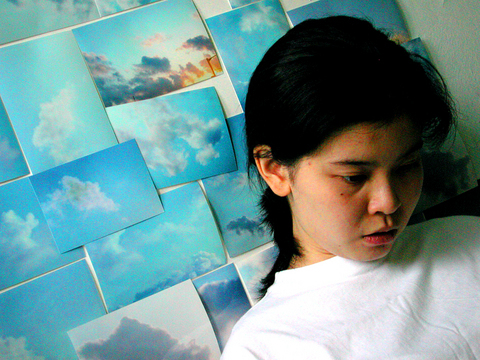The first Asian Lesbian Film and Video Festival (ALFF) (
Organized by the Gender and Sexuality Rights Association Taiwan (
In view of current European- and US-centric trends whereby a lot of works made by Asian women focusing on their historical and cultural experiences are circulated outside Asia and in the West, ALFF intends to build up an independent channel for the dissemination of comparative perspectives on sexual-political issues.

PHOTOS COURTESY OF ASIAN LESBIAN FILM AND VIDEO FESTIVAL
The organizers have vowed to alter the "imagined" images of Asian lesbians seen in most Western discourses by voicing "real" and diverse Asian experiences dramatically different from those of their Western counterparts.
The festival has lined-up 31 films including features,
documentaries, experimental works from Taiwan, Hong Kong, China, Japan, South Korea, Thailand, the Philippines and Malaysia, among other Asian countries.

All the films are divided into six topical programs. These include a look at issues ranging from sexual/gender formation and identification, lesbian desire and sex, violence and social injustice, individual and collective experiences in the course of post/neo-colonial, capitalistic modernization, family values and patriarchal oppression and subversion of the mainstream.
Teaming up with the Center for Asia-Pacific/Cultural Studies, National Tsing Hua University, the festival will also arrange panel discussions, workshops and lectures held by invited artists and scholars to further explore the socio-cultural issues relating to gender and sexuality in inter-Asian context.
Those eager to participate in this event but who live outside Taipei, fear not. The festival will go on tour to central and southern Taiwan between September and December, and there are plans for screenings in China, Hong Kong and the Philippines next year.
Invited filmmakers from various Asian countries will also be present in Taipei for question-and-answer sessions after the screenings. Most of the works have both Chinese and English subtitles, with the exception of around eight films. Ticket price ranges from NT$180 to NT$200, available through http://www.artsticket.com.tw.
For more information, go to http://alff2005.gsrat.net, or call (02) 8251 0105.
Event Notes
What: Asian Lesbian Film and Video Festival
Where: Spot -- Taipei Film House, 18, Zhongshan N Rd, Sec 2, Taipei
When: Today until Aug. 10
Tickets: NT$180 to NT$200

By 1971, heroin and opium use among US troops fighting in Vietnam had reached epidemic proportions, with 42 percent of American servicemen saying they’d tried opioids at least once and around 20 percent claiming some level of addiction, according to the US Department of Defense. Though heroin use by US troops has been little discussed in the context of Taiwan, these and other drugs — produced in part by rogue Chinese Nationalist Party (KMT) armies then in Thailand and Myanmar — also spread to US military bases on the island, where soldiers were often stoned or high. American military policeman

Under pressure, President William Lai (賴清德) has enacted his first cabinet reshuffle. Whether it will be enough to staunch the bleeding remains to be seen. Cabinet members in the Executive Yuan almost always end up as sacrificial lambs, especially those appointed early in a president’s term. When presidents are under pressure, the cabinet is reshuffled. This is not unique to any party or president; this is the custom. This is the case in many democracies, especially parliamentary ones. In Taiwan, constitutionally the president presides over the heads of the five branches of government, each of which is confusingly translated as “president”

An attempt to promote friendship between Japan and countries in Africa has transformed into a xenophobic row about migration after inaccurate media reports suggested the scheme would lead to a “flood of immigrants.” The controversy erupted after the Japan International Cooperation Agency, or JICA, said this month it had designated four Japanese cities as “Africa hometowns” for partner countries in Africa: Mozambique, Nigeria, Ghana and Tanzania. The program, announced at the end of an international conference on African development in Yokohama, will involve personnel exchanges and events to foster closer ties between the four regional Japanese cities — Imabari, Kisarazu, Sanjo and

Sept. 1 to Sept. 7 In 1899, Kozaburo Hirai became the first documented Japanese to wed a Taiwanese under colonial rule. The soldier was partly motivated by the government’s policy of assimilating the Taiwanese population through intermarriage. While his friends and family disapproved and even mocked him, the marriage endured. By 1930, when his story appeared in Tales of Virtuous Deeds in Taiwan, Hirai had settled in his wife’s rural Changhua hometown, farming the land and integrating into local society. Similarly, Aiko Fujii, who married into the prominent Wufeng Lin Family (霧峰林家) in 1927, quickly learned Hoklo (commonly known as Taiwanese) and